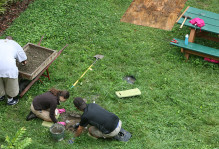The straw is too long
Notes from March 6, 2012
Michael Cammarata ’12 (ourth project trip) is this year’s clinic coordinator and he has organized meds, worked with our medical providers, and helped to manage local logistics. He is deeply invested in the project and in the prospects for improving the delivery of medical services. Dr. Roger Martinez (our Nicaraguan doctor from the beginning of the project) and Dr. John Showalter (returning for the second year as a medical provider) have seen nearly 100 patients in the first day of the clinic, and in spite of the demands, their energy seems always to outlast our supply of medicine. In part, this is because we have not yet found the strategically appropriate way to organize our clinic efforts. As “Dr. John” notes, it does not make a lot of sense for physicians to see patients for whom they will prescribe, invariably, Tylenol, adult vitamins, and anti-parasite meds. We will meet with health brigadistas (volunteers appointed by the mayor to help coordinate health services in the communities) to discuss more appropriate ways of using our medical services. In the meantime, we struggle with the issue of who to see and how to see those who would benefit most from our medical services and medicine.
Working with Dr. Tellez from the Totagalpa clinic, we will take a field medical team into communities where we have not been for several years. Dr. John, Julie Sangimino ’12 (4th project trip) and Johnathan Maza ’15 (2nd research trip) head to Mojon Uno and Las Menas. The plan was to travel with a brigadista, but something went wrong. The team proceeds nonetheless and gets help along the way from a local girl who happily shows the way. The team sees, among others, an elderly woman with end-stage rheumatoid arthritis. Her husband apologizes the the inconvenience and says that he would have carried her to the clinic if he had been able.
The newest team members, Ambika Babbar ’14 (1st project trip), Stephanie Wraith ’15 (1st trip), and Carrie Perry-Hoyt (administrative associate in the Office of Community Engagement and Scholarship — more on that later) have spent the day in the clinic and have seen or the first time the operation and effects of our small medical program. It probably is clearer to them than before that our clinic is an important resource, but not the long-term solution to health and health care. They have seen the spirit and grace of the residents who come; the dignity and patience that belie the difficulty of their lives.
Daniel Fischer ’12 (1st year on the project) and Zander Pellegrino ’15 (1st year) have their first turn on the field research team and participate in focus group interviews with groups in the morning and afternoon. The focus groups are lead by Alex Ferraro ’12 (4th project trip) and Yardley Albarracin ’13 (3rd trip) — who are becoming master interviewers and group facilitators. They work together in seamless ways to invite, solicit, and nurture them in group members’ comments, and to articulate and express intersections of hopes and possibilities. I am moved by their skillfulness and their ability to express their affection and their dedication to the community, to the model of development, and to the possibilities for the future.



No comments.
Comments are currently closed. Comments are closed on all posts older than one year, and for those in our archive.